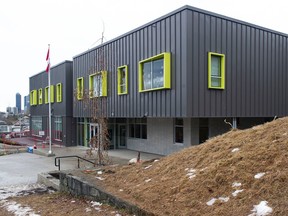The name is in the Musqueam language hən̓q̓əmin̓əm̓ and in English means 'the sun rising over the horizon.'

Vancouver’s Sir Matthew Begbie Elementary School has a new name.
It’s now called wək̓ʷan̓əs tə syaqʷəm, which in English means “the sun rising over the horizon.”
Start your day with a roundup of B.C.-focused news and opinion delivered straight to your inbox at 7 a.m., Monday to Friday.
Thanks for signing up!
A welcome email is on its way. If you don't see it, please check your junk folder.
The next issue of Sunrise presented by Vancouver Sun will soon be in your inbox.
The name is written in the Musqueam language hən̓q̓əmin̓əm̓, which uses the North American phonetic alphabet instead of the Latin alphabet used for English.
It was selected in collaboration with the Musqueam language and culture department in recognition of Vancouver’s Hastings Sunrise neighbourhood where the school is located, according to a news release Friday from the Vancouver school board.
As for the pronunciation of the new school name, the Musqueam Nation prefers not to spell it out phonetically, and asks people to listen to the pronunciation. People can listen to Musqeuam elder Larry Grant pronounce wək̓ʷan̓əs tə syaqʷəm on YouTube.
A shortened version of the name, wək̓ʷan̓əs Elementary, is grammatically correct and considered a respectful interpretation, according to school board. That word translates to “sun rising.”
The board and Musqueam nation held a renaming ceremony Friday for the school, at 3150 Kitchener St. in Vancouver. They also celebrated the completion of the new seismically safe school.
As part of the province’s seismic mitigation program, B.C. spent $22.4 million to replace the school. The original school was constructed 100 years ago.

“Hən̓q̓əmin̓əm̓ is the language our ancestors spoke for thousands of years, which was systematically taken from us to the point that there are no longer any fluent hən̓q̓əmin̓əm̓ speakers in Musqueam,” said Chief yəχʷyaχʷələq (Wayne Sparrow) in a statement provided from the school board.
“Being asked to share our language with partners, and provide hən̓q̓əmin̓əm̓ names to replace names associated with colonization, is an important step toward rights recognition, reconciliation and hən̓q̓əmin̓əm̓ revitalization. Musqueam looks forward to continuing to strengthen our relationship with VSB and schools throughout our territory,” he added.
Board superintendent Helen McGregor said asking Musqueam to give the school a hən̓q̓əmin̓əm̓ name is one way for the school district to show its commitment to reconciliation.
“It increases the knowledge, awareness, appreciation of and respect for Musqueam history, language, tradition, culture and contributions,” she said.
The MLA for Vancouver—Hastings, Niki Sharma, said the collaboration between the Musqueam and the school district’s Indigenous education department on selecting the new name is an important example of reconciliation in schools.
“I’m looking forward to seeing how the new facility and name will support families and shape the wək̓ʷan̓əs tə syaqʷəm school community in the years to come,” said Sharma, in a statement.
According to the board, the new, seismically safe school was built with Canadian mass timber, a new type of engineered wood that reduces greenhouse gas emissions.
Begbie was B.C.’s first chief justice and a controversial figure known as the hanging judge after Tsilhqot’in chiefs, who thought they were attending peace negotiations, were seized and put on trial for murder in the 1800s.
During the Chilcotin War of 1864, several members of the Tsilhqot’in Nation killed workers constructing a road through their territory, according to the B.C. government. The attack and several other small skirmishes between this group and settlers in the area resulted in the deaths of 21 people.
A colonial militia was formed and, soon after, several Tsilhqot’in members agreed to come to the militia camp for peace talks, according to the B.C. government. Instead, the peace party was seized and put on trial for murder. The trial was presided over by Begbie, who sentenced them to hang.
A sixth chief was later captured and hanged in New Westminster.
In 2014, premier Christy Clark apologized to the Tsilhqot’in people. In 2018, Prime Minister Justin Trudeau exonerated the chiefs and offered an apology to six of the current Tsilhqot’in Chiefs on the floor of the House of Commons.
ticrawford@postmedia.com


